Unit 6 Lesson 36 Clean Cars课件+音频(共25张PPT) 冀教版八年级上册
文档属性
| 名称 | Unit 6 Lesson 36 Clean Cars课件+音频(共25张PPT) 冀教版八年级上册 |
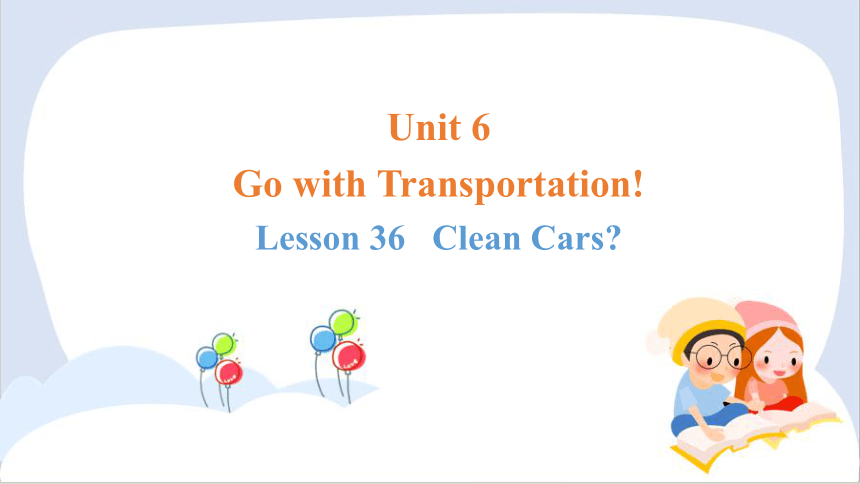
|
|
| 格式 | pptx | ||
| 文件大小 | 3.1MB | ||
| 资源类型 | 教案 | ||
| 版本资源 | 冀教版 | ||
| 科目 | 英语 | ||
| 更新时间 | 2024-10-21 21:12:50 | ||
图片预览

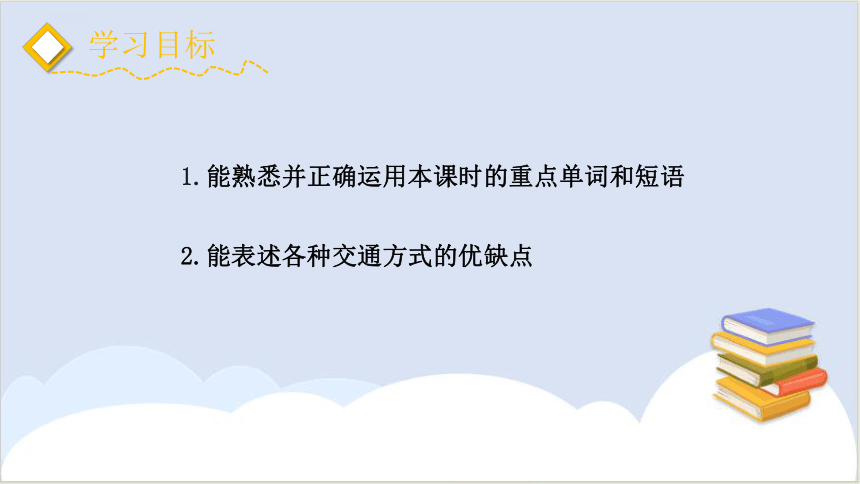
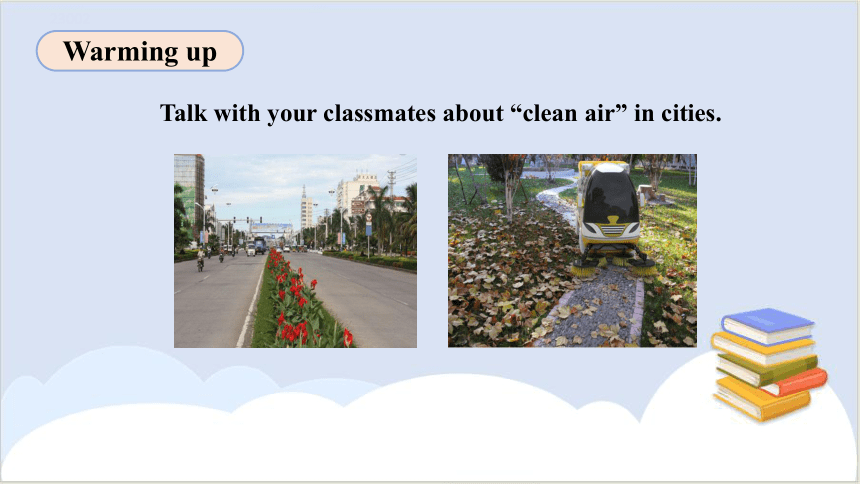


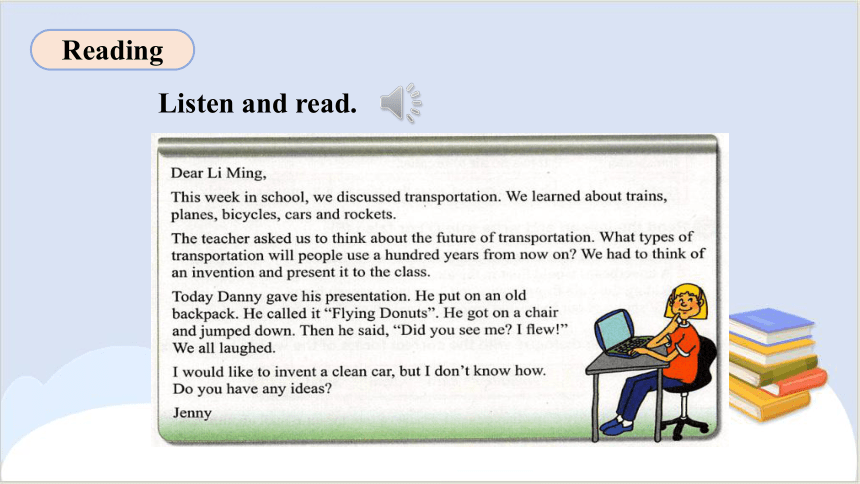

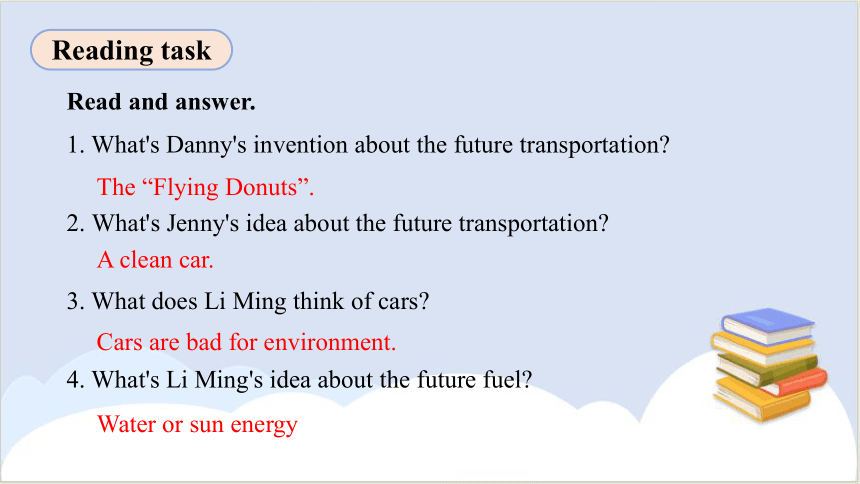

文档简介
(共25张PPT)
Unit 6
Go with Transportation!
Lesson 36 Clean Cars
学习目标
1.能熟悉并正确运用本课时的重点单词和短语
2.能表述各种交通方式的优缺点
Talk with your classmates about “clean air” in cities.
Warming up
New words
sun energy
water energy
wind energy
pedal n. 踏板
v. 踏……的踏板;骑自行车
n. 能量
He pedalled for more than two hours.
超过;多于
conj.比
Listen to the tape and fill in the table.
Future transportation
(1)Jenny’s class discussed this week in school.
(2)Danny gave his presentation. He put on an old __________
called “Flying Donuts”.
(3)Li Ming for more than an hour around the city.
(4)In the future, cars will probably use or _______
energy to power them.
transportation
backpack
pedalled
water
sun
Listening
新课讲授
Listen and read.
Reading
1. What's Danny's invention about the future transportation
2. What's Jenny's idea about the future transportation
3. What does Li Ming think of cars
4. What's Li Ming's idea about the future fuel
The “Flying Donuts”.
A clean car.
Cars are bad for environment.
Water or sun energy
Read and answer.
Reading task
They __________ transportation.
They ______ _____ trains, planes, bicycles, cars and rockets.
discussed
learned about
What did they do this week in school
Read and fill in the blanks.
The teacher _____ them __ _______ _______ the future of transportation.
They had to ____ ___ an invention, and ______ it ___ the class.
to think about
asked
think of
to
present
What did the teacher ask them to do
He _____ his presentation.
He ___ ___ an old backpack.
He _____ it Flying Donuts.
He ___ __ a chair and ________ _____.
He thought he ____.
gave
put on
got on
jumped down
flew
called
What did Danny do today
He thinks they are very ______.
Everyone _______ ____ bicycles.
Our air would be ____ _____ _______.
dirty
should ride
a lot cleaner
What did he do to help clean the air
He ____ _____ the city.
He _______ for _____ ____ an hour.
rode across
pedalled
more than
What does Li Ming think of cars
Let's have an interview.
How do you like to travel
Do you like to travel on a bike/bus/train/plane/ship/in a car.
Why / Why not
faster/ safer/ comfortable/ convenient/ be good for health or environment.....
Pair work
1.Jenny and Li Ming talked about different types of transportation over the next ________ years.
□one hundred □one thousand □one million
2.Jenny would like to invent a ________.
□ hoverboard □clean car □backpack
3.Li Ming travelled across the city by ________.
□bus □bike □train
√
√
√
Listen and tick the correct answers.
Let’s Do It!
1
Read the lesson and fill in the blanks.
This week,Jenny's class discussed _____________.
They ________ about trains,planes,rockets and more. The teacher asked them to think about the future of transportation. They had to think of an invention and ________ it to the class. Danny gave a very interesting presentation. He _____ on an old backpack. He _____ on a chair and ________ down. He wanted to fly.
transportation
learned
present
put
got
jumped
2
Fill in the blanks with the correct forms of the words or phrases in the box.
1. The air in the mountains is much ________ than it is in the cities.
2. He __________ a good idea to solve the problem.
3. Everything _________ last week. The newcomer got on well with the others.
4. Danny stood in front of the class and gave his ___________ on his new form of transportation.
5. Eating too much junk food ___________ our health.
6. Your idea ________ fun.
present sound clean go well think of be bad for
cleaner
thought of
went well
3
sounds
presentation
is bad for
What are the advantages and disadvantages of different types of transportation Talk with your partner and fill in the table.
Transportation car/bus bicycle plane train ship
Advantages
Disadvantages
4
1. What different kinds of fuel may be used in the future
1) kind表示“种类”时,常用于短语:
a kind of...“一种……”;
all kinds of...“各种各样的……”;
different kinds of...“各种各样的……”。
e.g. It is a kind of animal with long ears and a short tail.
Language points
2) be used 被使用
拓展:
be used to do sth. 被用于做某事
be used to doing sth. 习惯于做某事 (to 是介词)
used to do sth. 过去经常做某事
2. What types of transportation will people use a hundred years from now on
from now on:从现在开始,相当于in future,句子一般使用将来时态。
e.g. From now on I'm going to study English every day.
3. That sounds like a fun project!
sound v.听起来 n. 声音
sound表示“听起来”,是一个连系动词,后面常接形容词作表语。
e.g. Your idea sounds great.
辨析sound like, feel like和look like
sound like “听起来像……;似乎”,like 是介词,常接名词,不可用于进行时态。
e.g. That sounds like a helicopter.
feel like “想要”,后接名词、代词或动名词。
e.g. Do you feel like going out for a walk?
look like “看起来像……”
e.g. He looks like his brother.
4. That way, our air would be a lot cleaner.
a lot修饰比较级,表示“....得多”。
可以用来修饰形容词或副词的比较级形式﹐以示加强语气的词或短语有: much; even; still; far; rather; any; no; a lot; a little; a bit; a great deal等。
e.g.
He is getting (too)much fatter these days.
1. She is always full of e_______.
2. Lucy is taller t_____ Lily.
3. —Let’s have a picnic this Sunday.
—That s______ very interesting.
4. Does your father d_____ to work or ride a bike to work
一、根据句意及首字母提示补全单词。
当堂检测
nergy
han
ounds
rive
1.You haven’t (answer) my questions yet.
2. He asked them (finish) the project in three months.
3. They (pedal) for two hours in the new city last Sunday.
4. Have you thought about (invent) anything new
5. These students came here (see) the new kind of car.
answered
to finish
pedalled
inventing
to see
二、用所给词的适当形式填空
Words:
pedal, than, energy
Phrases:
learn about, think about, from now on
Sentences:
That sounds like a fun project!
课堂总结
Unit 6
Go with Transportation!
Lesson 36 Clean Cars
学习目标
1.能熟悉并正确运用本课时的重点单词和短语
2.能表述各种交通方式的优缺点
Talk with your classmates about “clean air” in cities.
Warming up
New words
sun energy
water energy
wind energy
pedal n. 踏板
v. 踏……的踏板;骑自行车
n. 能量
He pedalled for more than two hours.
超过;多于
conj.比
Listen to the tape and fill in the table.
Future transportation
(1)Jenny’s class discussed this week in school.
(2)Danny gave his presentation. He put on an old __________
called “Flying Donuts”.
(3)Li Ming for more than an hour around the city.
(4)In the future, cars will probably use or _______
energy to power them.
transportation
backpack
pedalled
water
sun
Listening
新课讲授
Listen and read.
Reading
1. What's Danny's invention about the future transportation
2. What's Jenny's idea about the future transportation
3. What does Li Ming think of cars
4. What's Li Ming's idea about the future fuel
The “Flying Donuts”.
A clean car.
Cars are bad for environment.
Water or sun energy
Read and answer.
Reading task
They __________ transportation.
They ______ _____ trains, planes, bicycles, cars and rockets.
discussed
learned about
What did they do this week in school
Read and fill in the blanks.
The teacher _____ them __ _______ _______ the future of transportation.
They had to ____ ___ an invention, and ______ it ___ the class.
to think about
asked
think of
to
present
What did the teacher ask them to do
He _____ his presentation.
He ___ ___ an old backpack.
He _____ it Flying Donuts.
He ___ __ a chair and ________ _____.
He thought he ____.
gave
put on
got on
jumped down
flew
called
What did Danny do today
He thinks they are very ______.
Everyone _______ ____ bicycles.
Our air would be ____ _____ _______.
dirty
should ride
a lot cleaner
What did he do to help clean the air
He ____ _____ the city.
He _______ for _____ ____ an hour.
rode across
pedalled
more than
What does Li Ming think of cars
Let's have an interview.
How do you like to travel
Do you like to travel on a bike/bus/train/plane/ship/in a car.
Why / Why not
faster/ safer/ comfortable/ convenient/ be good for health or environment.....
Pair work
1.Jenny and Li Ming talked about different types of transportation over the next ________ years.
□one hundred □one thousand □one million
2.Jenny would like to invent a ________.
□ hoverboard □clean car □backpack
3.Li Ming travelled across the city by ________.
□bus □bike □train
√
√
√
Listen and tick the correct answers.
Let’s Do It!
1
Read the lesson and fill in the blanks.
This week,Jenny's class discussed _____________.
They ________ about trains,planes,rockets and more. The teacher asked them to think about the future of transportation. They had to think of an invention and ________ it to the class. Danny gave a very interesting presentation. He _____ on an old backpack. He _____ on a chair and ________ down. He wanted to fly.
transportation
learned
present
put
got
jumped
2
Fill in the blanks with the correct forms of the words or phrases in the box.
1. The air in the mountains is much ________ than it is in the cities.
2. He __________ a good idea to solve the problem.
3. Everything _________ last week. The newcomer got on well with the others.
4. Danny stood in front of the class and gave his ___________ on his new form of transportation.
5. Eating too much junk food ___________ our health.
6. Your idea ________ fun.
present sound clean go well think of be bad for
cleaner
thought of
went well
3
sounds
presentation
is bad for
What are the advantages and disadvantages of different types of transportation Talk with your partner and fill in the table.
Transportation car/bus bicycle plane train ship
Advantages
Disadvantages
4
1. What different kinds of fuel may be used in the future
1) kind表示“种类”时,常用于短语:
a kind of...“一种……”;
all kinds of...“各种各样的……”;
different kinds of...“各种各样的……”。
e.g. It is a kind of animal with long ears and a short tail.
Language points
2) be used 被使用
拓展:
be used to do sth. 被用于做某事
be used to doing sth. 习惯于做某事 (to 是介词)
used to do sth. 过去经常做某事
2. What types of transportation will people use a hundred years from now on
from now on:从现在开始,相当于in future,句子一般使用将来时态。
e.g. From now on I'm going to study English every day.
3. That sounds like a fun project!
sound v.听起来 n. 声音
sound表示“听起来”,是一个连系动词,后面常接形容词作表语。
e.g. Your idea sounds great.
辨析sound like, feel like和look like
sound like “听起来像……;似乎”,like 是介词,常接名词,不可用于进行时态。
e.g. That sounds like a helicopter.
feel like “想要”,后接名词、代词或动名词。
e.g. Do you feel like going out for a walk?
look like “看起来像……”
e.g. He looks like his brother.
4. That way, our air would be a lot cleaner.
a lot修饰比较级,表示“....得多”。
可以用来修饰形容词或副词的比较级形式﹐以示加强语气的词或短语有: much; even; still; far; rather; any; no; a lot; a little; a bit; a great deal等。
e.g.
He is getting (too)much fatter these days.
1. She is always full of e_______.
2. Lucy is taller t_____ Lily.
3. —Let’s have a picnic this Sunday.
—That s______ very interesting.
4. Does your father d_____ to work or ride a bike to work
一、根据句意及首字母提示补全单词。
当堂检测
nergy
han
ounds
rive
1.You haven’t (answer) my questions yet.
2. He asked them (finish) the project in three months.
3. They (pedal) for two hours in the new city last Sunday.
4. Have you thought about (invent) anything new
5. These students came here (see) the new kind of car.
answered
to finish
pedalled
inventing
to see
二、用所给词的适当形式填空
Words:
pedal, than, energy
Phrases:
learn about, think about, from now on
Sentences:
That sounds like a fun project!
课堂总结
同课章节目录
- Unit 1 Me and My Class
- Lesson 1 Back to School!
- Lesson 2 Many Faces, One Picture
- Lesson 3 Getting to Know You!
- Lesson 4 Best Friends
- Lesson 5 Meet Ms. Liu
- Lesson 6 Jenny's Week
- Unit 2 My Favourite School Subject
- Lesson 7 Don't Be Late for Class!
- Lesson 8 E-mail Helpers!
- Lesson 9 I Don't Want to Miss Geography !
- Lesson 10 Looking for Lisa
- Lesson 11 Lily Learns about China !
- Lesson 12 Karen's Hair Stood Up!
- Unit Review
- Unit 3 Families Celebrate Togethe
- Lesson 13 I Love Autumn
- Lesson 14 Happy Memories
- Lesson 15 A Present for Li Ming!
- Lesson 16 Happy Thanksgiving!
- Lesson 17 Presents from Canada!
- Lesson 18 Li Ming's Birthday
- Unit Review
- Unit 4 My Neighbourhood
- Lesson 19 The Best Neighourhood
- Lesson 20 No Stopping!
- Lesson 21 Eat a Donut and Turn Right
- Lesson 22 I Like My Neighbourhood
- Lesson 23 People in My Neighbourhood
- Lesson 24 I Need a Map!
- Unit Review
- Unit 5 My Future
- Lesson 25 I Want to Be a Teacher!
- Lesson 26 What Will I Be ?
- Lesson 27 What's Your Advice?
- Lesson 28 Rich or Poor? It Doesn't Matter!
- Lesson 29 Our Ambitions and Dreams
- Lesson 30 A Famous Friend?
- Unit Review
- Unit 6 Go With Transportation !
- Lesson 31 How Do You Travel ?
- Lesson 32 Trains Go Faster !
- Lesson 33 Life on Wheels
- Lesson 34 Flying Donuts
- Lesson 35 Future Transportation
- Lesson 36 Clean Cars ?
- Unit Review
- Unit 7 Enjoy Your Hobby
- Lesson 37 What's Your Hobby ?
- Lesson 38 Hobbies Are Fun!
- Lesson 39 Danny's Hobby
- Lesson 40 What's Paul's Hobby?
- Lesson 41 Show and Tell!
- Lesson 42 The New Club
- Unit Review
- Unit 8 Celebrating Me
- Lesson 43 What Makes You Unique?
- Lesson 44 Georgia Plays Basketball
- Lesson 45 Be Yourself !
- Lesson 46 My Dream
- Lesson 47 I Made It !
- Lesson 48 Li Ming's Report
- Unit Review
